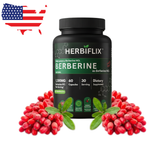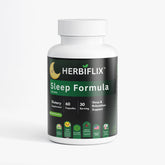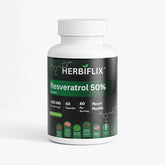Berberine vs. Metformin: What You Need to Know
Berberine vs. Metformin: What You Need to Know for Your Metabolic Health
In the evolving landscape of metabolic health and blood sugar support, two powerful compounds often emerge in discussions: Berberine and Metformin. While one is a well-established prescription medication and the other a revered natural alkaloid, both have demonstrated remarkable capabilities in influencing glucose metabolism and promoting overall wellness. At Herbiflix, we believe in empowering our community with accurate, science-backed information to make informed decisions about their health. This comprehensive guide will delve into the nuances of Berberine vs. Metformin, helping you understand their mechanisms, benefits, and key differences.
Understanding Metformin: The Pharmaceutical Powerhouse
Metformin is a first-line prescription drug widely used to treat Type 2 Diabetes Mellitus (T2DM) and, in some cases, Polycystic Ovary Syndrome (PCOS). Classified as a biguanide, its primary mechanism of action revolves around the liver. Metformin works by:
- Reducing glucose production in the liver (hepatic gluconeogenesis).
- Increasing insulin sensitivity in peripheral tissues (muscles and fat), allowing them to absorb more glucose from the blood.
- Decreasing glucose absorption from the gastrointestinal tract.
Metformin has been extensively studied and is known for its efficacy in lowering blood sugar levels, improving lipid profiles, and potentially offering cardiovascular benefits. However, like all medications, it can come with side effects, most commonly gastrointestinal issues such as nausea, diarrhea, and abdominal discomfort, especially when first starting the medication.
Exploring Berberine: Nature's Metabolic Ally
Berberine is a bioactive compound extracted from several different plants, including Berberis species (e.g., European barberry, Oregon grape), goldenseal, and Coptis chinensis. Used for centuries in traditional Chinese and Ayurvedic medicine, berberine has garnered significant scientific interest in recent decades for its profound effects on metabolic health and blood sugar support. Its mechanisms are surprisingly similar to, and in some aspects, broader than Metformin's:
- AMPK Activation: Berberine activates AMP-activated protein kinase (AMPK), often dubbed the "master switch" of metabolism. This enzyme plays a crucial role in regulating energy balance, improving insulin sensitivity, and reducing glucose production in the liver, much like Metformin.
- Improved Insulin Sensitivity: It enhances the body's response to insulin, allowing cells to take up glucose more effectively.
- Glucose Uptake: Berberine can increase glucose uptake into cells, independent of insulin, further contributing to lower blood sugar levels.
- Gut Microbiome Modulation: Research suggests berberine positively influences the gut microbiome, which is increasingly recognized for its role in metabolic health.
- Lipid Metabolism: Beyond blood sugar, berberine has shown promise in improving cholesterol and triglyceride levels, supporting overall heart health.
As a natural compound, berberine is available as a dietary supplement and is increasingly sought after by individuals looking for holistic blood sugar support and general metabolic wellness. Side effects are generally mild and may include digestive upset, similar to Metformin, but often less severe.
Shared Pathways: Where They Converge
The most striking similarity between Metformin and berberine lies in their ability to activate AMPK. This shared mechanism explains why both compounds are so effective at influencing glucose metabolism. By "turning on" AMPK, they effectively signal the body to shift from energy storage to energy utilization, leading to improved insulin sensitivity, reduced liver glucose output, and better utilization of blood glucose. This common pathway underscores their potential as powerful tools for managing and supporting metabolic health.
Key Differences: Prescription vs. Supplement
While their mechanisms overlap, it's crucial to understand their fundamental differences:
- Origin & Regulation: Metformin is a synthetic pharmaceutical drug, rigorously regulated and prescribed by healthcare professionals. Berberine is a natural plant alkaloid, sold as a dietary supplement, which means it undergoes different regulatory scrutiny.
- Primary Use: Metformin is a proven drug for diagnosed conditions like Type 2 Diabetes. Berberine, while showing significant promise, is typically used as a natural supplement for blood sugar support, to maintain healthy metabolic function, or as a complementary approach under medical supervision.
- Side Effect Profile: Both can cause gastrointestinal issues. However, Metformin has a more established profile as a drug with specific warnings, while berberine's side effects are generally considered milder, though individual responses can vary.
- Broadness of Action: Berberine appears to have a broader range of effects, including significant impacts on the gut microbiome and lipid metabolism, which are still being fully explored in Metformin research.
Who Should Consider Which?
The choice between Berberine and Metformin, or whether to use either, should always be made in consultation with a healthcare professional. Here's a general guide:
- Metformin: Is prescribed for individuals diagnosed with Type 2 Diabetes or other conditions like PCOS. It's a medical treatment and should only be used under a doctor's guidance.
- Berberine: May be considered by individuals looking for natural blood sugar support, those with pre-diabetes, or those seeking to optimize their metabolic health. It can also be explored as an adjunct to conventional treatments, but always discuss this with your doctor, especially if you are already on medication, as berberine can interact with certain drugs.
It's vital never to self-prescribe Metformin or stop taking prescribed medication without medical advice. Berberine should be treated with the same respect, used judiciously, and ideally, under professional guidance, especially if you have underlying health conditions.
Embracing Berberine for Holistic Metabolic Support with Herbiflix
For individuals exploring natural avenues to enhance their metabolic health and support healthy blood sugar levels, berberine stands out. Its multifaceted action, from activating AMPK to influencing the gut microbiome, makes it a compelling choice. If you're considering integrating this powerful compound into your regimen, quality and purity are paramount. That's why at Herbiflix, we meticulously source and formulate our products to ensure maximum efficacy. Explore the benefits of Herbiflix Berberine HCL 1200mg – a premium supplement designed to support healthy blood sugar, heart, and metabolic health. Our commitment is to provide you with a trustworthy product that aligns with your wellness goals.
Conclusion: Informed Choices for Your Health Journey
Both Berberine and Metformin are potent compounds with significant roles in managing and supporting metabolic health, particularly in the realm of blood sugar regulation. While Metformin is a well-established pharmaceutical treatment for diagnosed conditions, berberine offers a compelling natural alternative or complementary approach for those seeking robust blood sugar support and overall metabolic wellness. Understanding their individual mechanisms and differences is crucial for making informed decisions. Always consult with your healthcare provider to determine the best path for your unique health needs, ensuring a safe and effective strategy for your journey towards optimal health.





